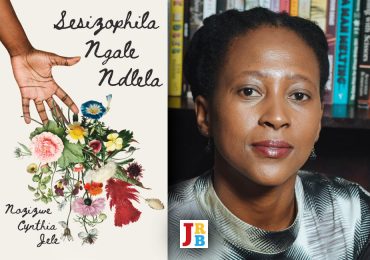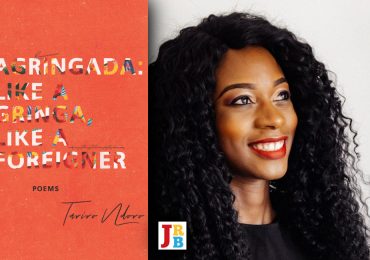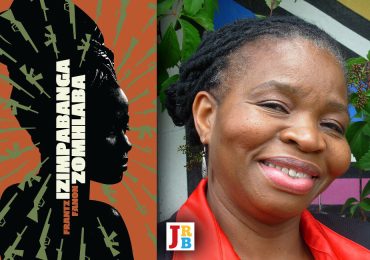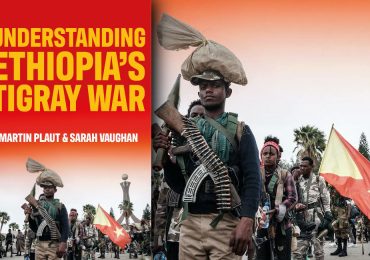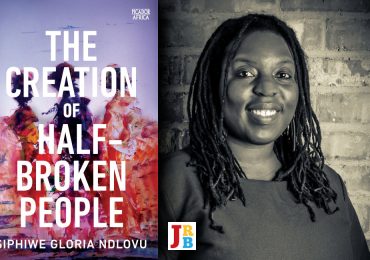Contributing Editor Efemia Chela speaks to CA Davids about her new novel, How to Be a Revolutionary.
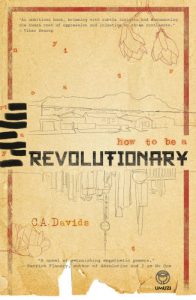
How to Be a Revolutionary
CA Davids
Verso, 2021
Efemia Chela for The JRB: Fortuitously, at the same time I was reading your book I was listening to a podcast series on Shamima Begum, who was drawn to ISIS by a woman recruiter, as far as Scotland Yard could tell. Radicalisation seems like a very intimate process that can happen fairly quickly and irrevocably. In nineteen-eighties Cape Town, Beth becomes seduced by the revolutionary life through the fiery, street smart, ideologically sharp Kay. Could you speak a little bit about how you see Kay and Beth’s dynamic as friends and comrades?
CA Davids: It’s very interesting that you reference Shamima Begum. She, along with her bright school friends, were radicalised, leading the girls to flee the UK to join Islamic State. I was fascinated and heartbroken by that story; I still am because it is ongoing (her British citizenship has been revoked and she remains in a prison camp in Syria, I believe, and cannot make amends for the past or move forward). But she was a child when she made these astonishing, fateful, life decisions.
We don’t often evaluate South Africa’s liberatory movements with the idea that there was radicalisation, perhaps because the moral imperative was so clear in South Africa—apartheid was an atrocity, and the need for freedom so fundamental. There is no question for me that the Struggle was important and often, but not always, heroic.
Yet, I’d say that when one can no longer evaluate ideas with objectivity, or when a movement one belongs to restricts wider political engagement via censorship and self-censorship—and these might be so insidious as to be almost invisible (for example, we don’t read those papers, we don’t talk to those people even when there is common political cause)—then yes, I think there is a form of radicalisation going on. I get that this kind of mindset is a tool of war, but it also apprehends empathy, and while the former may be important to the project of war, it is dangerous to the act of being human. There are so many instances I could give, but let’s look at the way people in the USA have been radicalised by Trump et al: they are so sealed off and hostile to any way of thinking that contradicts their own belief systems. They often refuse to see any vantage or cause but their own.
Kay and Beth’s friendship was fundamentally unequal. You had a mentor–protégé dynamic in a sense. Those sorts of friendships fascinate me. There’s lots of writing and storytelling about friendships among peers, but it is not the only profound form of friendship.
The JRB: That’s true, and it can be more interesting to look at those other forms of companionship across kinds of differences, friendships that seem less obvious initially. Beth and Zhao’s relationship is one of those, too, and within it lies a divine chance for a do-over.
In February 2021, the Chinese government declared the achievement of a seven-decade long goal. They had officially vanquished extreme poverty by raising the living standards of 850 million people. This boon is juxtaposed by the how and the stories of ordinary people who were swept up in this The Great Leap Forward. Huang Zhao is a fragile link to a people’s history of China’s ‘success story’. How did the character of Huang come about?
CA Davids: In many ways, his character was inspired by a book called Tombstone: The Great Chinese Famine, 1958–1962 by Yang Jisheng. It’s an extraordinary autobiography of a Chinese Communist Party journalist who’d spent his life deeply committed to Communist Party principles, a party loyalist, but also someone who had wholeheartedly accepted the narrative about modern China. At some point he starts to doubt; and when he does he gains a different perspective of what actually happened in China. I was very moved by Jisheng’s profound act of scholarship too: surreptitiously collecting data from archives across China and transcribing the information by hand. By his calculation, at least Forty-five million people had died of starvation or been murdered during that process of The Great Leap Forward. So I was inspired by Tombstone and Jisheng, and I imposed a fictional narrative and character—Zhao—onto it. Zhao is not Jisheng; this is an important distinction I need to make. And I did this repeatedly in the novel … it is quite meta. I guess the only person who is himself is Langston Hughes. But even his voice is fictionalised. I was constantly weaving fact and fiction, and blurring truth with fable.
I also created Zhao because I wanted a deeper understanding of China. I loved living there but I was an outsider and so didn’t have access to the language and the culture. It was through acts of the imagination that I could, at a distance, experience some of the last fifty years in China as the country moved through these massive epochal changes: revolutions, economic and otherwise.
On your point about vanquishing poverty: yes, they mostly have, and this is an astonishing accomplishment. Yet, what was the cost? Forty-five million lives? Surely there was another way?
The JRB: It’s an exceptionally high price to pay. How did you end up in Shanghai?
CA Davids: I was with my family and a baby daughter. So my movements and access to the city were limited and in many ways I had to experience Shanghai and China vicariously, via books and imaginative leaps. There was a beautiful English bookstore in Puxi, the old city, where books were exceptionally cheap and I found much African American literature. I remember reading Du Bois’ The Souls of Black Folk at the time.
The JRB: Speaking of African American literature, I was fascinated by the relationship between Langston Hughes and Richard Rive. Is there a hint of the homoerotic between the two, whose letters make up part of the book? And was that energy drawn from the texture of their real-life correspondence?
CA Davids: The letters between the two men in real life were a lot less flirtatious, for sure, so certainly I imposed my own ideas onto their correspondence and friendship. The young Rive was quite flirtatious, self-aware and self-assured, as I think he was in real life. Still, I wanted to play with the idea of how these two writers might have interacted had they known the other was gay; but of course, given the era, neither had a public identity as being gay. I was also taken with the performativity of the letters; Langston Hughes was very conscious about the letters he wrote, which are now lodged at the Beinecke Library at Yale. These were public records, so how would they present themselves? But yes, the letters in the book are fictional. In real life Hughes’s fondest letters were to Bloke Modisane. They were really warm and full of affection. But Rive served my interests for the novel because it tied things back to Cape Town, which was very important to the structure of the novel and the plot lines.
The JRB: I’m fond of the idea of two men of colour who had complex relationships with their sexuality reaching across distances and the turbulent twentieth century, to talk semi-privately. Did you feel any pressure representing public figures and their voices?
CA Davids: I felt enormous pressure writing about Langston Hughes. It took me maybe a year to decide on the sort of approach to writing his voice. I knew I had to have him in the novel, but I wanted to be incredibly careful about how I wrote about him. I chose to write his voice in the second person because that put me at some distance to him. The second person felt like I was assuming less interiority.
I was also cautious because I come from communities and people in Cape Town who were often written about (and this telling about could not be questioned or contradicted at the same scale, because of censorship laws and barriers to entry): there was theatre about us, comedy about us and, growing up, I often felt mocked and ridiculed. But then, as a writer, one must imagine yourself into someone else’s experience to write with any degree of truthfulness. For me, research bridges some of that gap, and, by trying to read lives empathetically.
The JRB: Beth is a shadowy protagonist. She sleepwalks through life for many years, moving through the world with the weight of unfinished business upon her. But that changes when she moves to Shanghai on a whim, and after some months alone in the city she makes friends with her neighbour, Hung Zhao. Why did you decide to tell this story from her perspective as opposed to perhaps the more obvious choice, Kay’s?
CA Davids: Precisely because Beth ‘sleepwalks’—or at least, appears to do so. She is never the hero, perhaps an antihero of sorts, but because she is repulsed by being the centre of focus, for all kinds of personal and psychological reasons, she’s in an ideal situation to observe—however slow she is to come to a final realisation. As a fictional device it made more sense to tell the story from the point of view of the marginal observer: she is less subjective, more detached and therefore methodical about what she is able to see. Also, there is politics in this novel, so when your protagonist is a hero, there is more chance that the story feels polemical, and that becomes less compelling from a narrative point of view.
The JRB: Well that’s a nice little craft tip!
When we meet Beth as an adult, we discover she’s married and is a competent civil servant. Yet the issue of corruption, moral or political, wrests Beth and Andrew’s marriage apart. Beth is still part of the government. Andrew critiques the state from the private sector. What was it like reckoning with both their positions, which represent a contemporary debate in South African politics?
CA Davids: I understand both positions logically. We speak about radicalisation, but there is context to that: it doesn’t come without feeling loved and understood and being offered an ideological if not political home. A tribe. It feels quite anachronistic but this way of thinking is more common that we care to admit.
I think there’s a debate we need to have in contemporary South Africa: why when so many see corruption up close do we choose silence (and not just civil servants, though certainly them too)? Is it fear? We’ve seen brave, decent people being assassinated; threats against whistleblowers. But what of smaller acts of corruption, where there isn’t fear that personal security will be breached? Have we fully internalised the idea of democracy? Are we afraid of losing our salaries? I don’t say that in a belittling way at all. We need to get to grips with these questions to get out of the loop we’re in.
The JRB: My sense is we’ve become enveloped in a kind of apathy, where we feel corruption is inevitable so do nothing about it, which is a pity.
I’ve been reading The Sympathizer by Viet Thanh Nguyen for two years (yes, I know) and something the narrator says reminds me of the paradoxes of the TRC. He says: ‘But they aren’t innocent. Neither are we, my friend. We’re revolutionaries, and revolutionaries can never be innocent. We know too much and have done too much.’ Beth goes to the TRC to testify about what happened to Kay. What do you think she gets out of testifying? Do you think she gets what she wants?
CA Davids: I think the purpose and attainments of the TRC are sometimes misunderstood beneath the weight of the disappointments of its outcomes, and where we are right now as a country. The way I understood it, the TRC was an opportunity to tell the truth. To speak about the pain of what had happened to you or to people you’d lost. But it was also a chance to apportion blame, where crimes could be revealed and responsibility sited, if not accepted. It was a place of hope: that justice might triumph, allowing for some kind of forgiveness, or even acceptance. But many of the recommendations that came from the TRC were not implemented or followed through.
For the novel, Beth needed to offer testimony not just about a crime, but about a life that was lost and that seemed to be in the process of being forgotten. She had to speak her friend’s name aloud as well as her deeds. To remind a ‘forgetful nation’.
The JRB: Her speech act alone is deeply important.
By the way, do you ever find yourself slowly moving through books you enjoy but can’t seem to finish?
CA Davids: Oh yes. I have been reading The Golden Notebook by Doris Lessing for ten years. I know it’s going to hit any moment now … I have also been reading Tolstoy’s Anna Karenina for years. I think the fact that our plastic brains have so much to focus on doesn’t help. But I will finish and I have loved every word of both books so far.
The JRB: I’m glad I’m not alone.
You’ve written a one-sided epistolary novel inside of a transcontinental novel with different eras that intercut each other—1933, 1989, the nineteen-nineties. To me it felt like a spy’s dossier. Did you intend for How to Be a Revolutionary to take a complex form from the start?
CA Davids: If I had known how complex it would become, I might have hesitated or become immobilised. So it’s just as well (I think) I have quite a haphazard process when writing a novel. There is a rough plan, a key (plots that unlock the novel), I might have an arc in mind, but the rest of it is freewheeling and scatting, which is not the worst thing because I think the characters can grow or new characters can walk right in and occupy the page. But that’s only the first draft. It’s really in the editing process that a work of fiction is constructed for me.
The JRB: Interesting to hear that editing is the crucible for your work. How did you experience the process when completing How to Be A Revolutionary, which you published internationally with Verso Books?
CA Davids: I had a really great editor at Verso, Andrew Hsiao, but even before that my agent, Anjali Singh, was key. It took two to three years to write the book, then Anjali, who has also worked as an editor, and I worked on it, getting it ready for market. It did a round in 2018, and though I got some great feedback and met a few publishers in New York, it didn’t find the right home until Verso. I really appreciated Andrew’s input as he read from his perspective as a second-generation Chinese–American. He could weigh in on the subject matter. Both he and Anjali got what I was trying to do.
The JRB: Do you think writing fiction is one way to become a revolutionary? If so, why?
CA Davids: Probably not in most instances, no. But then, innovative ideas are good places to start revolutions. And fiction is a good place for ideas.
I also think there are clear instances where fiction has had revolutionary implications or outcomes. I want to mention two: Professor Crain Soudien writes about a group of activists in The Cape Radicals: Intellectual and Political Thought of the New Era Fellowship, 1930s–1960s. One of the group’s political aims was to conscientise themselves and others politically. They did this, in part, by reading fiction. Apparently, the sessions devolved into loud and heated discussions! Still, they used fiction as one vehicle or platform where they could analyse and deconstruct notions around race (this was around World War II; and race was still widely accepted as science). Their debates fed into other political projects, ultimately leading to their stance that race was socially constructed and had a political agenda.
I am not sure if the next example is apocryphal, but it’s said that when Abraham Lincoln met the author of anti-slavery novel Uncle Tom’s Cabin, Harriet Beecher Stowe, he said: ‘So this is the little woman that wrote the book that started this great war.’ He was, of course, referring to the American Civil War and the North’s opposition to slavery. What is certain is that the novel sold hundreds of thousands of copies and helped to animate the abolitionist cause.
The JRB: Wow. That’s amazing. I think the Cape Radicals were on to something, the turning of the mind, the change through reading. I like to believe that the very undertaking of creative work changes the creator. And so writing can be revolutionary even if the output isn’t obviously trying to provoke a change of perspective in the reader. Creative practice—I think it’s one of the only ways we can shapeshift as humans. And so if everyone takes on a creative project, we have a chance to move the wheel, as it were.
Finally, as an author how do you define success?
CA Davids: Honestly, being published by Verso and edited by Andrew felt like success to me. When someone reads and loves How to Be a Revolutionary, and if it resonates with them, or changes them, even if momentarily, that has meaning. After I read Richard Powers’ The Overstory I was transformed, and I’ll never think of a tree in the same way as I once did. If my writing could achieve a fraction of that, I’d feel like I succeeded.
- Efemia Chela is Contributing Editor. Follow her on Twitter.

